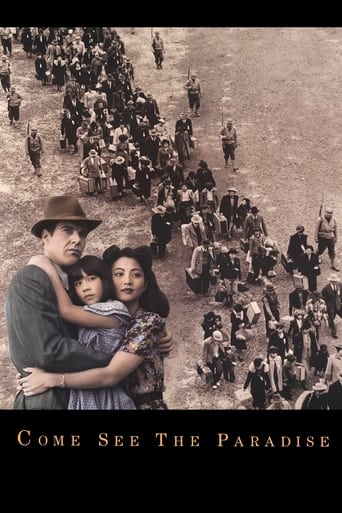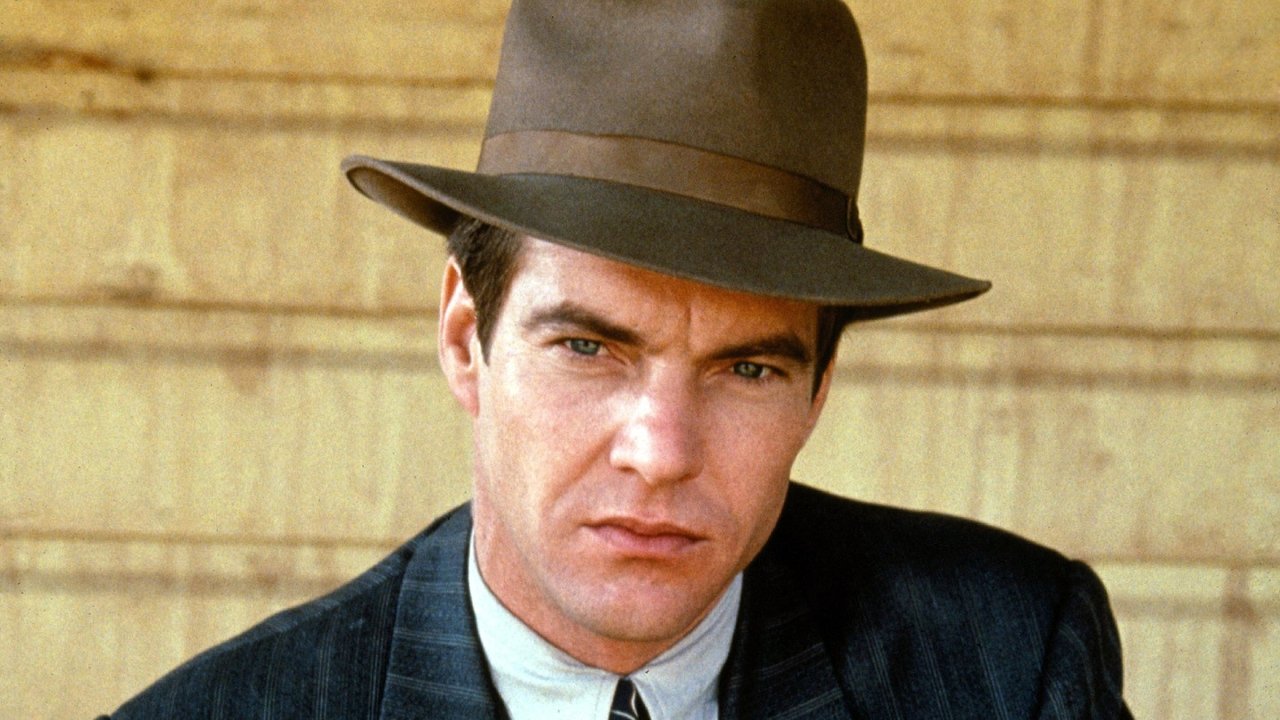bnair-14502
The movie "Come See the Paradise" was accurate in the fact that after the Pearl Harbor Attack, by the Japanese, the United States Government decided to relocate the Japanese into isolated internment camps in fear that some could be spies working at perhaps a bigger attack within America instead of on the coast. In the movie, Lily's family is forced to move out and forced into an internment camp without knowing why or when they will be released. Additionally, in the camp there were riots as well against the fact that the Japanese were ethnically isolated from the rest of society and Lily's brother took part in the riots with her family thinking that he wouldn't. In addition, Lily and Jack, Dennis Quaid's character, have had a daughter, who goes into the camp with her mother, while Jack goes into the Army, but not before one of the most lacerating scenes in the film, when Jack takes his little daughter to meet Santa Claus, and Santa refuses to let the child sit on his lap. "She's an American," Jack informs Santa, grabbing him, "and you will sit here and listen to what she wants for Christmas or I will kill you." "Come See the Paradise" has been criticized in a few places because it uses a technique that is common in movies about minority groups: A convenient Caucasian provides the point of view, so that the audience will have someone to identify with. The fact that it was told from this point of view does not sit well with me because the director is assuming a large Caucasian audience, which might not be the case, and the director also decides to include slurs appointed at the Japanese as well, which makes those that are Japanese watching this film very uncomfortable. So I think this movie was accurate. but in terms of audience liking it had a minimal effect on me.
hritchey-40709
Come See the Paradise is another typical Hollywood depiction of a rarely mentioned event in America's complicated history. The movie does its job of creating an emotional reaction and one that makes you feel sympathy for the characters and their situation, but in terms of historical content there are some inconsistencies. My biggest question after watching this film is the necessity of including a love story amongst a topic that could constitute its own movie. In my opinion, the notion of holding people in a camp against their will should constitute enough emotion that a romantic interest is not necessary. Sure, the love story adds an aspect of intrigue and brings people to the movie by playing up the romantic storyline, but, in actually, the depicted relationship is wildly inaccurate in a historical sense. An interracial couple such as Lily and Jack would have had immensely more struggles in their daily lives. The fact that they just walked into a wedding as a couple and nobody said anything to them would have been highly, highly unlikely in the 1930's. Likewise, the couple would have had trouble procuring service at a restaurant, getting a hotel room and even going out in public without garnering some quizzical looks. I understand the necessity of including a love story for modern audiences, but to someone watching with the intent to analyze historical content this can be more of a distraction than a delight. I believe that the scenes taking place in the camp could have completely stood on their own without the appearance of Dennis Quaid's character. Conversely, the movie was fairly accurate with other historical details related to the life of the Kawamuras. The recreation of Little Tokyo was filled with impressive props and attention to detail. The reference to the Japanese Citizen's League, Question 26 concerning American loyalty and the No-No boys were a sight for weary eyes at that point in the movie. In the end, nothing can be done about the fact that, overall, this is a Hollywood production and the main goal of the movie is to put people in the audience. In terms of historical accuracies, there was good attention to detail in general, though the love story is an unnecessary aspect of the film. The main redeeming aspect of this film is that it spreads the story of Japanese internment to Hollywood's audiences, but why must this be done through an aspect of love? Isn't the narrative of life before, during and after internment enough to create a film worthy of Hollywood?
anninapluff
I think this film does a decent job depicting the experiences of Japanese Americans during World War II. The movie spends a lot of time establishing a pre-war normalcy that is uprooted in the later parts of the movie. Lily Kawamura's (Tamlyn Tomita) family is well established and prominent among Japanese American elite circles. They are educated and well dressed and prove themselves to be just like any other American. Japanese Americans were just like any other Americans. Yet the contingencies of war took that all away from them. The movie in the beginning does capture a bit of the tensions between non-hyphenated Americans and the Japanese Americans, mainly through the interactions with Lily's father (Sab Shimono) and Jack McGurn (Dennis Quad). What the movie best achieves though is a depiction of life within the internment camps and the costs of upheaval for many Japanese Americans. Lily's family is forced to give away everything and depart from their home in San Francisco and partake in the forced internment. This tears Lily apart from her now husband Jack, which is certainly emotionally distressing but the whole love story between them is so painfully awkward and horrible to watch that it is hard to fully feel any emotions one way or the other. I think Alan Parker would have done a better job focusing a bit more on the internment experience rather than this irritating love story.
With that, the internment experience showed the further trials that Japanese Americans had to face. They were asked to remain loyal to a country that took everything away from them. The film shows the internees struggling to reply to the infamous "Loyalty Question," question numbers 27 and 28 on a survey that all internees had to take. The question essentially asked them to either declare themselves to be fully committed American citizens, and potentially fight for their country or: "Will you swear unqualified allegiance to the United States of America and faithfully defend the United States from any and all attacks by foreign or domestic forces, and forswear any form of allegiance to the Japanese emperor, to any other foreign government power or organization?" These sort of questions had immense repercussions for those who answered no, as we saw in the movie when Lily's brother was sent to the Tule Lake internment camp with the rest of the "no-no boys." The tensions between the Nisei and Issei generations held a lot of sway in the film as well, another aspect that was well represented in terms of camp life. Overall the film depicted a complicated time in American history but lacked in the romance aspect of the film.
gigan-92
Well, I recently experienced "Come See the Paradise" with Dennis Quad. The movie tells the often overlooked and not widely known story of Japanese Americans before, during and after WWII. This film was incredible to say the least, the characters very well drawn up and telling a simple love story beautifully. The performances are memorable and one can feel the sense of conflict in these characters. At times I was actually nearly brought to tears, a rare thing for me (the only movies that have ever made me cry are "Godzilla vs. Destroyah", "I am Legend", "Pokémon 2000" ,I was like seven, "Rodan" and "Schindler's List"). The encampment of Japanese-Americans is often overshadowed by Pearl Harbor and the Holocaust, but this film shows it how it really happened. The struggle of loyalty, patriotism and freedom all are called out in this movie quite nicely, the director just telling it how it is, you know? The story is sad one that finally lives up to its title, although I couldn't really enjoy it the first time around with my history teacher treating us like five year olds! I only wish it had a scene of the Atomic bomb being dropped on Nagasaki or Hiroshima. It would of helped audiences understand the atrocity of using such a weapon on defenseless civilians.



 AD
AD




